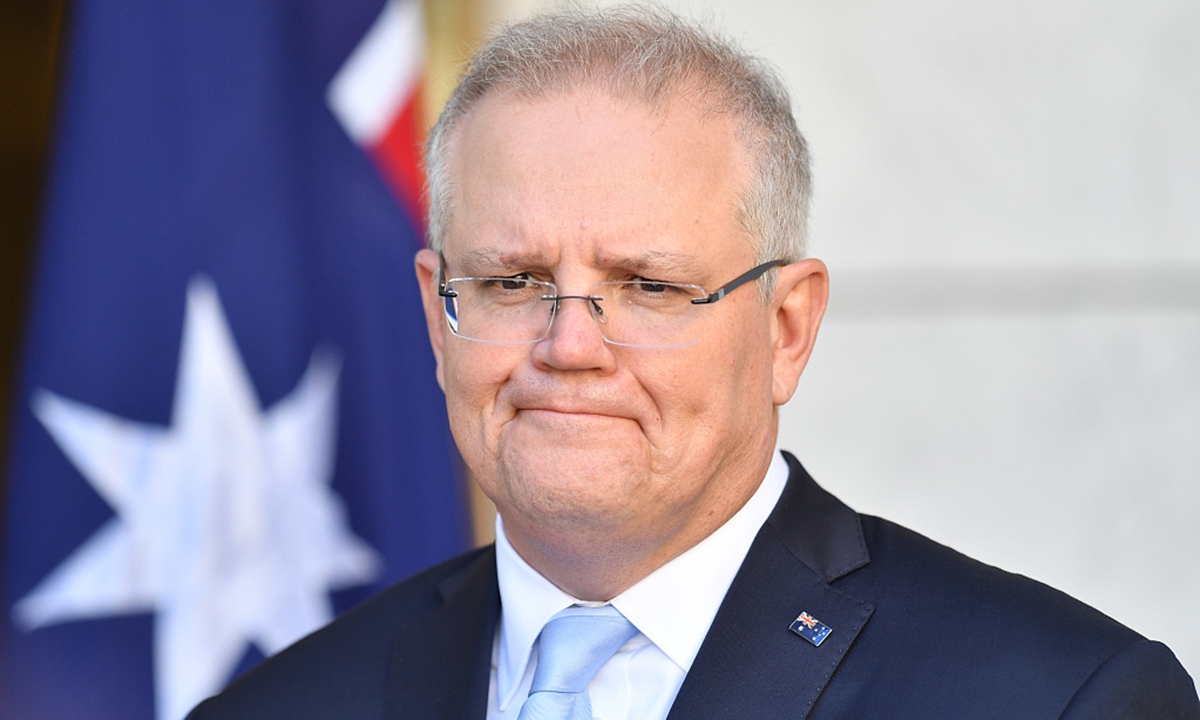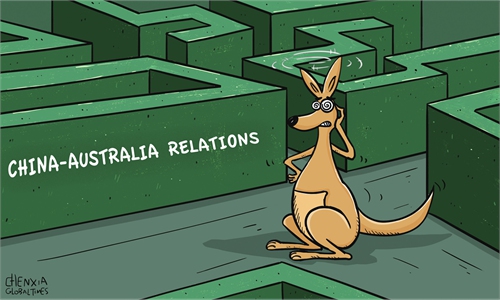
Australian Prime Minister Scott Morrison. Photo: VCG
If we use a few words to summarize the characteristics of the Morrison administration's diplomacy, it would definitely include "clumsy" and "reckless." These beg a further question: is it really good for Australia to keep building a tough national image while messing up its diplomatic relations with China?According to a poll conducted for The Australian newspaper, satisfaction with Australian Prime Minister Scott Morrison's performance has dropped to 44 percent, the lowest level since March 2020. With domestic dissatisfaction, the Morrison administration is also facing a diplomatic dilemma.
Australia has followed the US to pose an aggressive gesture toward China. But after Chinese President Xi Jinping's virtual meeting with US President Joe Biden, a Sky News Australia report said that, "Biden didn't really do Australia 'any favours'" in the meeting. Certain circles in Canberra have obviously been disappointed by the meeting result.
The whole world has paid huge attention to this meeting, Australia is also pretty anxious. Over the past years, Australia has discarded the diplomatic "balancing" it used to adopt. Instead, it has bet all its chips on the US although this will make Australians suffer economic losses.
During the Trump administration, Australia believed such a strategy was proper as the US was sparing no efforts to contain China at that time. After Joe Biden took office, although the essence of the US' China policy has not changed, its manner of dealing with China differs from that of Trump. Today, both sides are trying to find a way to peacefully coexist. But for Canberra under Morrison, even the slightest of improvements of China-US relations would put it in a very passive and awkward position.
Indeed, Australians now have doubts about the Morrison administration's leadership. From the domestic perspective, Australia's epidemic prevention and control cannot be regarded as a success. The normal order of life will not be restored for a long time. In terms of diplomacy, Australia, as a "middle power", has often been on the front page of international media in recent years. The Morrison government's aggressive diplomatic stance has surprised the Australian people and international community.
The Morrison government has regarded AUKUS, the trilateral security pact between Australia, the UK and the US, as a crucial diplomatic achievement. However, AUKUS has irritated France. It has further soured China-Australia ties due to its evident intention of targeting China. The pact has also made neighboring countries suspicious of Australia's intentions.
When it comes to China-Australia bilateral ties, the Morrison government seems to have no scruples. Australia is constantly testing the bottom line of China-Australia relations on some issues - just look at Australian Defense Minister Peter Dutton's rhetoric on the Taiwan question.
During the Xi-Biden virtual meeting this time, Australia has not seen any US statement on China-Australia relations. This has naturally made Australia feel disappointed. Fundamentally speaking, the current direction of Australia's China policy is wrong. The Morrison government has put China and Australia in opposite directions. It has also taken it for granted that Australia and the US should cooperate with each other to confront China. Such a mentality will only put Canberra's diplomacy in a more awkward situation.
In fact, the Australian federal government's foreign policy has sparked resentment in some states. They believe that the Morrison administration has messed up China-Australia relations and hurt local interests. For example, due to the deterioration of China-Australia relations, the economic and trade cooperation between the two countries has been greatly affected. Victoria and Western Australia are parting ways with the federal government, seeking to rebuild trade ties on their own with China. As the Australian federal election approaches, whether such pressure from states will lead to a change in the Morrison administration's China policy still remains to be seen.
The author is an assistant research fellow at the China Institute of International Studies. opinion@globaltimes.com.cn


